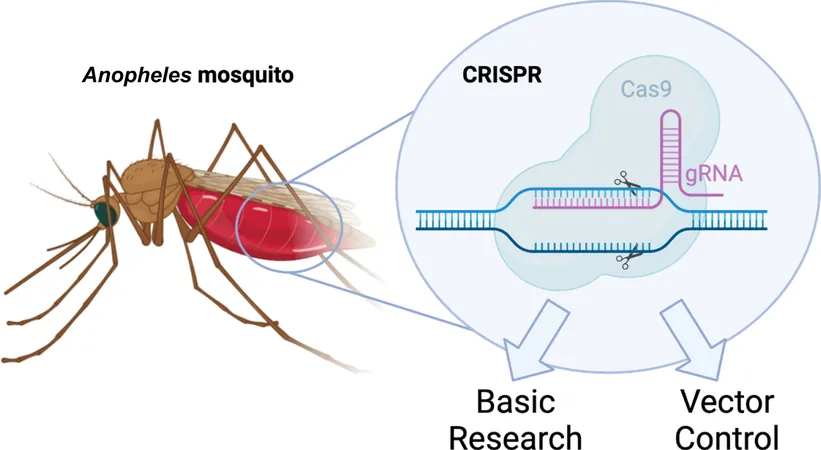
Unleashing CRISPR: Revolutionizing the Fight Against Malaria-Causing Mosquitoes
2025-07-03
Author: Li
An Ancient Enemy: Malaria's Historical Stranglehold
Malaria has long been a formidable foe for humanity, shaping our genetic landscape with protective traits like sickle cell and G6PD. Once rampant across the globe, it disrupted lives and even altered the course of battles, such as during the American Revolutionary War, where it devastated British troops while sparing American fighters.
Lessons from History on Modern Control
The eradication of malaria in various regions has shown that vector control is a potent weapon against its spread. Although past methods often caused ecological harm, the battle against malaria is now shifting toward modern, eco-friendly strategies. Insecticides and bed nets, while effective, are now challenged by evolving resistance, underscoring the need for innovative control methods.
The Promise of CRISPR Technology
As researchers leverage CRISPR technology, a groundbreaking approach to tackle the malaria-transmitting Anopheles mosquitoes emerges. CRISPR allows for precise genetic modifications, enabling the suppression or modification of mosquito populations responsible for malaria transmission.
From Gene Knockouts to Drives: The CRISPR Toolkit
Initial successes with CRISPR in Anopheles have laid the groundwork for advanced gene editing techniques. Early CRISPR applications, such as knocking out specific genes associated with parasite development, have opened doors for potential antimalarial gene operations. Researchers are exploring CRISPR's versatility—from population suppression to gene drives that can ensure engineered traits proliferate through mosquito populations.
Mapping Mosquito Behavior: Targeting Sensory Receptors
Understanding the sensory mechanisms that guide mosquito behavior is critical in controlling malaria transmission. Recent CRISPR studies have illuminated how mosquitoes locate hosts and breeding sites, revealing targets for future interventions that could drastically reduce disease spread.
Emerging Gene Drives: Changing the Game
The development of gene drives harnesses CRISPR's potential to ensure genetic modifications spread rapidly through populations. These innovative genetic tools promise to either suppress mosquito populations or replace them with modified variants that cannot transmit malaria. Though promising, the evolution of resistance poses challenges that must be managed before field deployment.
The Path Ahead: Future Innovations in Vector Control
Despite significant progress, some CRISPR-based strategies still require fine-tuning, particularly around effective anti-malarial traits and managing resistance. As researchers push forward, the anticipation grows for implementing these next-generation tools that could revolutionize malaria control.
Conclusion: A New Era in the Battle Against Malaria
With CRISPR technology at our disposal, the prospects for effective malaria control are brighter than ever. From gene knockouts to sophisticated gene drives, the future of vector control is on the horizon, potentially rewriting the narrative of malaria as a major global health threat.


 Brasil (PT)
Brasil (PT)
 Canada (EN)
Canada (EN)
 Chile (ES)
Chile (ES)
 Česko (CS)
Česko (CS)
 대한민국 (KO)
대한민국 (KO)
 España (ES)
España (ES)
 France (FR)
France (FR)
 Hong Kong (EN)
Hong Kong (EN)
 Italia (IT)
Italia (IT)
 日本 (JA)
日本 (JA)
 Magyarország (HU)
Magyarország (HU)
 Norge (NO)
Norge (NO)
 Polska (PL)
Polska (PL)
 Schweiz (DE)
Schweiz (DE)
 Singapore (EN)
Singapore (EN)
 Sverige (SV)
Sverige (SV)
 Suomi (FI)
Suomi (FI)
 Türkiye (TR)
Türkiye (TR)
 الإمارات العربية المتحدة (AR)
الإمارات العربية المتحدة (AR)